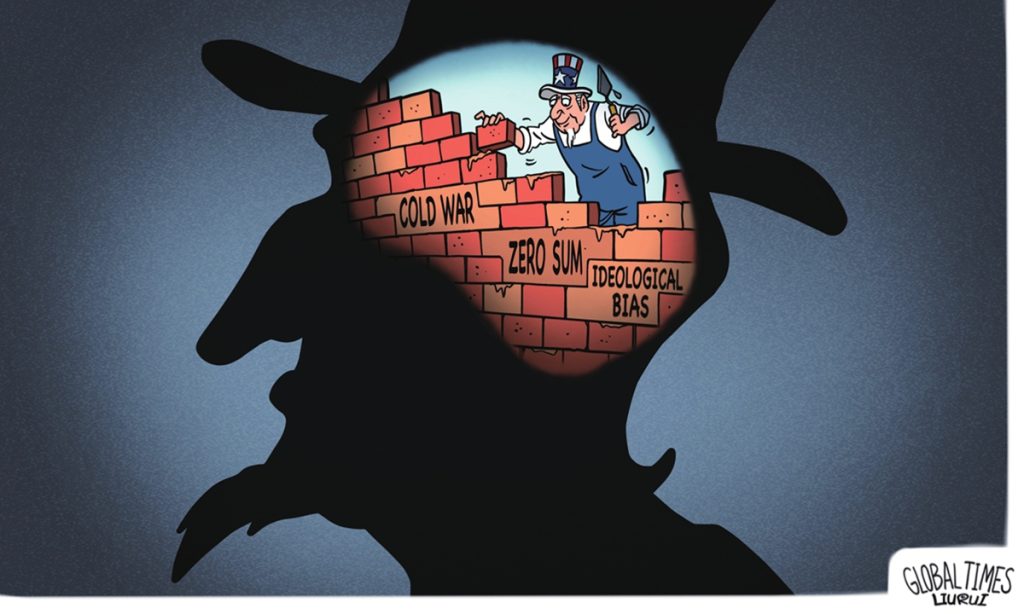GT Voice: Zero-sum mentality in US won’t halt China’s tech rise

American automaker Ford said on Monday it's pausing construction of a $3.5 billion electric vehicle (EV) battery plant in the US state of Michigan until it is confident it can run the factory competitively, the Associated Press (AP) reported. Although the US government is flexing all of its policy muscles available to suppress China's high-tech industry, US competitiveness in cutting-edge technologies has continued to decline as a result of multiple factors.
Ford's decision comes as the company is in the midst of national contract talks with the United Auto Workers union, which wants to represent workers at battery factories and win them top wages, according to the AP report. Intense competition among global EV manufacturers has unsettled the US automotive industry, which had been a pillar of the US economy, as US automakers are under pressure both at home and abroad.
On the one hand, competition from international competitors, including Chinese EV makers, poses a challenge to American firms, especially as Chinese companies have accumulated technological and price advantages against the backdrop of fierce competition in the Chinese domestic market.
On the other hand, deep-seated problems in the US economy, including insufficient labor protection and the widening wealth gap, have erupted in a concentrated manner. The car industry, like other manufacturing industries in the US, is facing increased pressure due to rising production costs.
As reported by the AP in March, Ford's EV business has lost $3 billion before taxes during the past two years. If the US automaker wants to catch up with rivals amid intense international competition, one option for Ford is to collaborate with top Chinese companies.
Ford in February announced plans to build the plant in Michigan, betting that making the batteries in the US would help it and Chinese partner CATL attract US customers to embrace a lower-cost technology pioneered in China, according to Reuters. Honestly speaking, Ford's cooperation with CATL benefits the development of the US EV industry. However, the sector's survival opportunities are being stifled by politicians in Washington. Republicans in Congress have been probing Ford's battery plant plan over concerns it could leave Ford dependent on Chinese technology.
As reported by Reuters, Rep. Mike Gallagher said lawmakers were "encouraged to see Ford take a crucial first step to reevaluate its deal" with CATL. "Now, Ford needs to call off this deal for good," he added.
Not only in the EV industry, but also in most high-tech and cutting-edge industries, some people in the US possess an extremely unhealthy and unfair zero-sum competition mentality toward China. However, it is evident that this thinking is counterproductive in promoting the development of domestic US industries.
Apart from Tesla, other American vehicle companies still have a relatively low share in the domestic and international EV markets. Although the US government has devised protectionist measures such as the Inflation Reduction Act, it is still moving slowly in terms of addressing domestic supply chain issues, particularly in the production of batteries.
Washington is working toward a zero-sum competition with China, with American firms serving as victims. What Chinese enterprises need to do is to confront external challenges, continuously enhance their competitiveness, strengthen technological innovation, seize the opportunities created by Washington's zero-sum competition mentality - which has caused difficulties for American enterprises - and continuously strengthen themselves.
China is becoming increasingly competitive in EV manufacturing capacity and technology innovation. Chinese EV brands, such as BYD and NIO, have made significant strides in developing advanced EV technologies, including battery technology and autonomous driving features.
China holds a superior position in the EV supply chain, with about three-quarters of the world's battery production capacity. Moreover, China houses more than half of the world's processing and refining capacity for lithium, cobalt and graphite, which are essential materials for making EV batteries.
The West's narrow-minded, zero-sum game mentality has indeed put some pressure on China in the short term, but it cannot fundamentally hinder technological progress. If the US always opts for dirty tricks against China instead of learning how to conduct healthy competition with Chinese enterprises and develop its own economic competitiveness, this will just lead to a larger gap between China and the US.